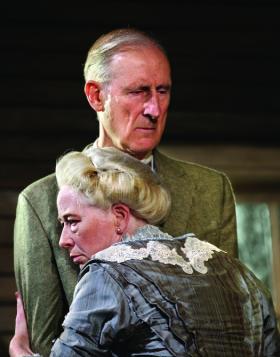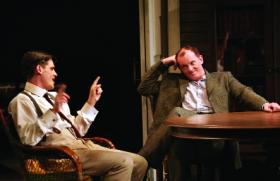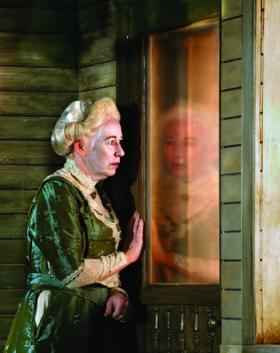Theatre Eye
Published in Issue 6 (Nov/Dec 2007), Reviews, Volume 15
The father, James Tyrone (James Cromwell), is a tight-fisted, burnt-out mediocrity.
Long day’s journey into night
Eugene O’Neill
Gaiety Theatre, Dublin, Dublin Theatre Festival, October 2007
by Eamon O’Flaherty
Garry Hynes’s production of O’Neill’s last and possibly greatest play was one of the highlights of this year’s Dublin Theatre Festival. A mixed cast of two Irish and two American actors tackled one of the most demanding plays in modern theatre. Like most of O’Neill’s plays, Journey is triple length, the Gaiety production lasting nearly five hours. The play is heavily autobiographical, reflecting O’Neill’s abiding concern with the analysis of his own background. The wealth of circumstantial detail means that it is sometimes difficult when reading biographies of O’Neill to assess the degree to which accounts of his life have been derived from his own works rather than from historical sources. Even a casual survey of electronic resources, notoriously unreliable in any event and dangerously influential on academics and journalists alike, reveals an alarming lack of any clear distinction between fact and fiction. This can even extend into the world of print, where assessments of O’Neill’s significance can all too easily turn into résumés of his oeuvre. Furthermore, O’Neill’s towering importance in American literature was a fact widely recognised almost from the beginning of his career as a playwright in the years after the Great War: three Pulitzer prizes in the 1920s, the Nobel prize for literature in 1936 and an unprecedented fourth Pulitzer for Long day’s journey into night when it was finally produced on Broadway in 1946. It can sometimes seem as if O’Neill has overawed his critics, and even directors of his plays can succumb to the authority of his stage directions.
Journey is a particularly difficult play in this regard, which has never prevented it from being attempted by the greatest directors in the theatre. The major challenge posed to players and audience alike is the lack of any action in Journey, which is a torrent of words and interlocution. The play’s very length is, of course, a necessary part of its success. The tragedy of the characters is that they are doomed to confront each other in a repeated and unending cycle of recrimination. There is something very reminiscent of the modern Irish theatre in the appparently static quality of Journey, and this is one reason why the choice of Druid, arguably a company that is extremely faithful to the traditions of the twentieth-century Irish stage, was a good one. Inevitably, the Dublin production will also be asked to take a position on the question of O’Neill’s Irishness. Here the intentions, at least, of director and company are clear.
Because it is the most autobiographical of his plays, Long day’s journey into night provides plenty of material for someone seeking to answer the question. Wearing his theatre-critic’s hat, Fintan O’Toole argues persuasively, but rather too enthusiastically perhaps, for O’Neill’s relevance to both countries at all times. On the face of it, Eugene Gladstone O’Neill, who remarked ‘I was born in a hotel and I’ll damn well die in a hotel’, did not really belong anywhere except twentieth-century America. He never visited Ireland. Were it not for his name many people might have been unaware—on the basis of his ground-breaking earlier work—that he had an Irish connection. Much discussion of O’Neill has been dominated by two powerful aspects of his legacy in American literature—the cultural and intellectual influence of psychoanalysis, and the

Edmund, his younger son (Michael Esper, left), is dying of consumption, while Jamie, his elder son (Aidan Kelly, right), is an alcoholic failure.
union of Greek tragedy and American modernism in a brilliant and revolutionary transformation of an American stage that had, before O’Neill, been dull, provincial and mediocre. O’Neill’s father, James O’Neill, made his fortune playing the leading role in several thousand performances of The Count of Monte Cristo—financially lucrative, but the end of a promising career as a serious Shakespearian actor.
Journey is a play about O’Neill’s family, fictionalised as James and Mary Tyrone and their sons Jamie and Edmund, while a lost third son, Eugene, who died as a child, exists as a silent spectre. The events of the play are the interactions between the four characters over a single day and night, during which each character’s weaknesses are pitilessly exposed. There is a comparison with the stifling claustrophobia of Sartre’s Huis Clos (1944), though the two were composed independently and divided by the gulf of war. James Tyrone, brilliantly performed by the American actor James Cromwell, is a tight-fisted, burnt-out mediocrity, while his wife Mary is a manipulative drug addict who cannot live with what she has become. Jamie, the elder son, is an alcoholic failure, and Edmund, the younger son, is dying of consumption. Rather like Joyce, O’Neill’s fictional meditations on himself consist of exploring possible or alternative selves. There are aspects of him in all the Tyrone boys, but also aspects of his own sons, Shane and Eugene, who committed suicide at the age of 40. Completely absent is any reflection of O’Neill’s difficult relationship with his daughter Oona, who married Charlie Chaplin at the age of 17 when he was the same age as O’Neill, or any reflection of his three turbulent marriages.
The centrality of the father is really the play’s anchor, and central to the relationship between Tyrone and his sons are the circumstances of Tyrone’s childhood and early struggles as a poor Irish immigrant, laboriously climbing the ladder of success in an alien, hostile country. Journey is one of the great pieces of literature of the Irish diaspora. The redemption that finally emerges after the painful struggles of the play, in which each character is successively pitted against the others, is ushered in by an impressive soliloquy wherein James Tyrone confesses that his own financial and emotional meanness is born out of the harshness of the emigrant experience, and he is ennobled, finally, by suffering—and love—for his lost country, for his exploited mother and ultimately for his own children.

His wife Mary (Marie Mullen) is a manipulative drug addict who cannot live with what she has become.
(All images: Druid Theatre Company)
The psychological and structural bent of O’Neill criticism is perfectly understandable, given the nature of the plays, but the current trend towards a reassessment of O’Neill that pays closer attention to the political and historical context of his work must also, at some stage, lead to a long-overdue serious assessment of his relationship to the Irish diaspora.
Eamon O’Flaherty lectures in history at University College Dublin.
















